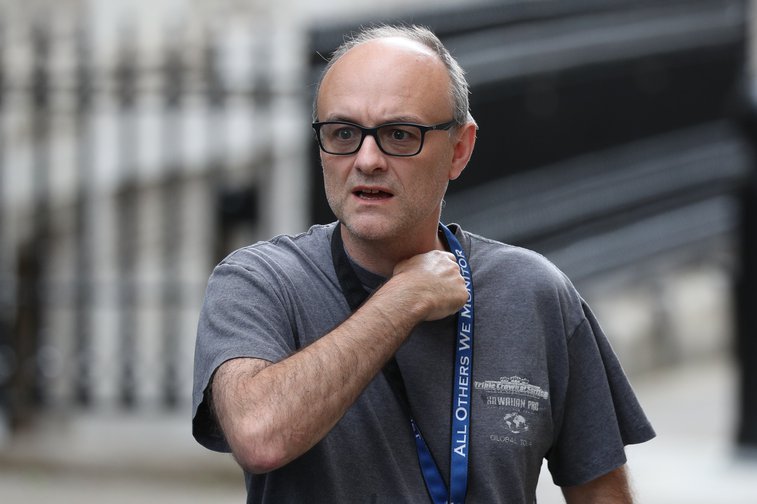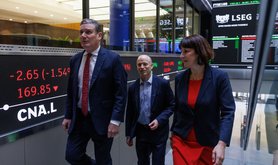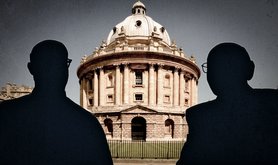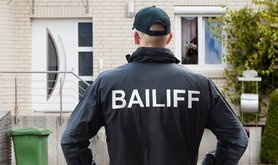
Revealed: Key Cummings and Gove ally given COVID-19 contract without open tender
Cabinet Office accused of breaching rules after handing £840,000 contract to PR firm run by co-author of the 2019 Tory manifesto for focus groups initially listed as 'EU Exit Comms'.

The Cabinet Office has awarded an £840,000 contract for researching public opinion about government policies to a company owned by two long-term associates of Michael Gove and Dominic Cummings, without putting the work out for tender.
Public First, a small policy and research company in London’s Tufton Street, is run by James Frayne - whose work alongside Cummings dates back to a Eurosceptic campaign 20 years ago - and Rachel Wolf, a former advisor to Gove who co-wrote the Conservative Party’s 2019 election manifesto.
The government justified the absence of a competitive tendering process, which would have enabled other companies to bid, under emergency regulations that allow services to be urgently commissioned in response to the COVID-19 crisis.
However the Cabinet Office’s public record states that portions of the work, which involved conducting focus groups, related to Brexit rather than COVID-19, a joint investigation by openDemocracy and the Guardian has established.
Get dark money out of UK politics!
Sign our petition to put pressure on the government to tighten electoral laws and shine more light on political donations. We need to know who is giving what to our political parties.
A Cabinet Office spokesman said that this was due to bookkeeping methods, insisting that all the focus group research done by Public First was in fact related to the coronavirus crisis.
The Cabinet Office, where Gove is the minister responsible, initially commissioned Public First to carry out focus groups from 3 March, although no contract at all was put in place until 5 June.
Government work is legally required to be put out for competitive tender, so that a company best qualified to carry it out is appointed, except under exceptional circumstances such as an unforeseen emergency.
When a contract was finally produced on 5 June, it was made retrospective, to cover the work that had already been done since 3 March. The Cabinet Office paid Public First £253,000 for the two projects stated to be related to Brexit and two more pieces of work, before the contract was put in place.
Public First was required to conduct focus groups “covering the general public and key sub-groups”, according to a Cabinet Office letter.
The firm was required to provide the government with “topline reporting” of their findings on the same day, with fuller findings reported the following day. The deal also included “on-site resource to support Number 10 communications,” the secondment to Downing Street of Public First partner Gabriel Milland, whose stint concluded on 26 June.
Milland was formerly head of communications at the Department for Education when Gove was the minister and Cummings the was his political adviser.
The Cabinet Office said in the letter that it had commissioned the work from Public First for a total £840,000 without any tender “due to unforeseeable consequences of the current COVID-19 pandemic.” The conduct of focus groups, understood to have concentrated on public responses to the government’s own communications, was classed as “extremely urgent deliverables” in the context of the pandemic.
According to further details published by the government under its transparency requirements, Public First were paid £58,000 on 18 March for its first focus group work, classed by the Cabinet Office as being for “Gov Comms EU Exit Prog,” then a further £75,000 on 20 March for work this time classed as “Insight and Evaluation.”
On 2 April, 10 days into the lockdown ordered the previous month, and with increasing numbers of people dying due to COVID-19, the Cabinet Office paid Public First a further £42,000, listed again as “EU Exit Comms.” The first payment stated to be for work that was listed as being related to the virus was on 27 May: £78,187.07. In total, £253,187.07 was paid to Public First before the contract was entered into on 5 June.
The Cabinet Office spokesman said that all the focus group work did relate to the government’s COVID-19 messaging, and that the references to Brexit in the government’s official disclosures were misleading.
He said that the Cabinet Office accounts department did not immediately open a “cost code” classification for expenditure relating to the crisis, so the payments were initially allocated to an existing cost code, which included communications about Brexit.
The Cabinet Office spokesperson said that Gove, as the minister, and Cummings, who is the prime minister’s chief adviser, as a political adviser, had no role in selecting companies supplying services to the government.
Frayne and Cummings’ political partnerships date back at least to 2000, when they worked together on Business for Sterling, the campaign against Britain joining the euro. In 2003 they co-founded a right-wing think tank, the New Frontiers Foundation, then the following year set up the campaign to fight the proposed formation of a regional assembly in the North East.
Cummings has described that victorious campaign, which was based on portraying politicians as a drain on ordinary people, as “a training exercise for an EU referendum.”
After Gove became education secretary following the 2010 election, with Cummings as his chief political adviser, Frayne was in 2011 appointed the department’s director of communications.
Wolf, a former special adviser to Gove, ran the New Schools Network in 2010 to promote free schools, which was awarded a £500,000 contract by the department in 2010 without a tender. It was justified on the basis that hers was the only organisation able to provide expert support quickly enough.
The Cabinet Office contract with Public First is being challenged by the Good Law Project, which wrote to Gove on Thursday arguing that the absence of a tendering process was unlawful and not justified by the COVID-19 emergency provisions.
In a letter warning Gove that it plans to seek a judicial review of the contract award, the project’s lawyers, Rook Irwin Sweeney, argue there is “apparent bias” in the contract going to Public First, due to their “close personal and professional connections” with Gove and Cummings.
The UK government has been criticised recently for awarding public contracts to firms with long-standing relationships with senior government figures. After openDemocracy threatened legal action, the government released contracts for NHS data signed with a number of tech firms, including Faculty, which was involved in the Cummings-led Vote Leave campaign.
Asked if Public First’s links to Gove and Cummings, who is the prime minister’s chief adviser, were a factor in the firm being awarded the contract, the Cabinet Office spokesman replied: “This is nonsense. Public First were contracted to undertake this work because of their wealth of experience in the area.
“Public First was awarded a contract to carry out daily focus groups across the country in response to the COVID-19 crisis,” the spokesman said. “They carried out this work to make sure the vitally important public health messages the Government was issuing were the right ones. This work will continue to inform future COVID-19 campaign activity.”
Rachel Reeves, Labour’s shadow Cabinet Office minister, said: “It beggars belief that the government’s desperate defence of handing a contract for daily focus groups on COVD-19 and Brexit to longstanding friends of ministers is coincidence and clerical incompetence. They should come clean about the purpose of this project, why this company was chosen without it going to tender and publish the research findings and recommendations for people to see for themselves.”
Ian Makgill, founder of the transparency procurement initiative Open Opps said: "Awarding contracts without having a transparent and open competition is a breach of the procurement regulations and has a chilling effect on public markets. If suppliers are not scrutinised and contracts are not awarded on merit, new companies will be dissuaded from bidding, stifling innovation and driving up costs."
Steve Goodrich, senior research officer at Transparency International said: "Government should be crystal clear about when their use of emergency procurement rules start and end.
"When one politically-connected company is awarded uncompetitive public contracts it smells a bit off, but when this happens again and again it reeks of cronyism. Government should be securing the best value for money it can, even during a time of crisis. Ministers must avoid even the perception that they are doing favours for friends."
Public First declined to comment.
Read more
Get our weekly email




Comments
We encourage anyone to comment, please consult the oD commenting guidelines if you have any questions.